Human Rights Defenders
Maria Ressa: "2024 will tell if democracy survives"
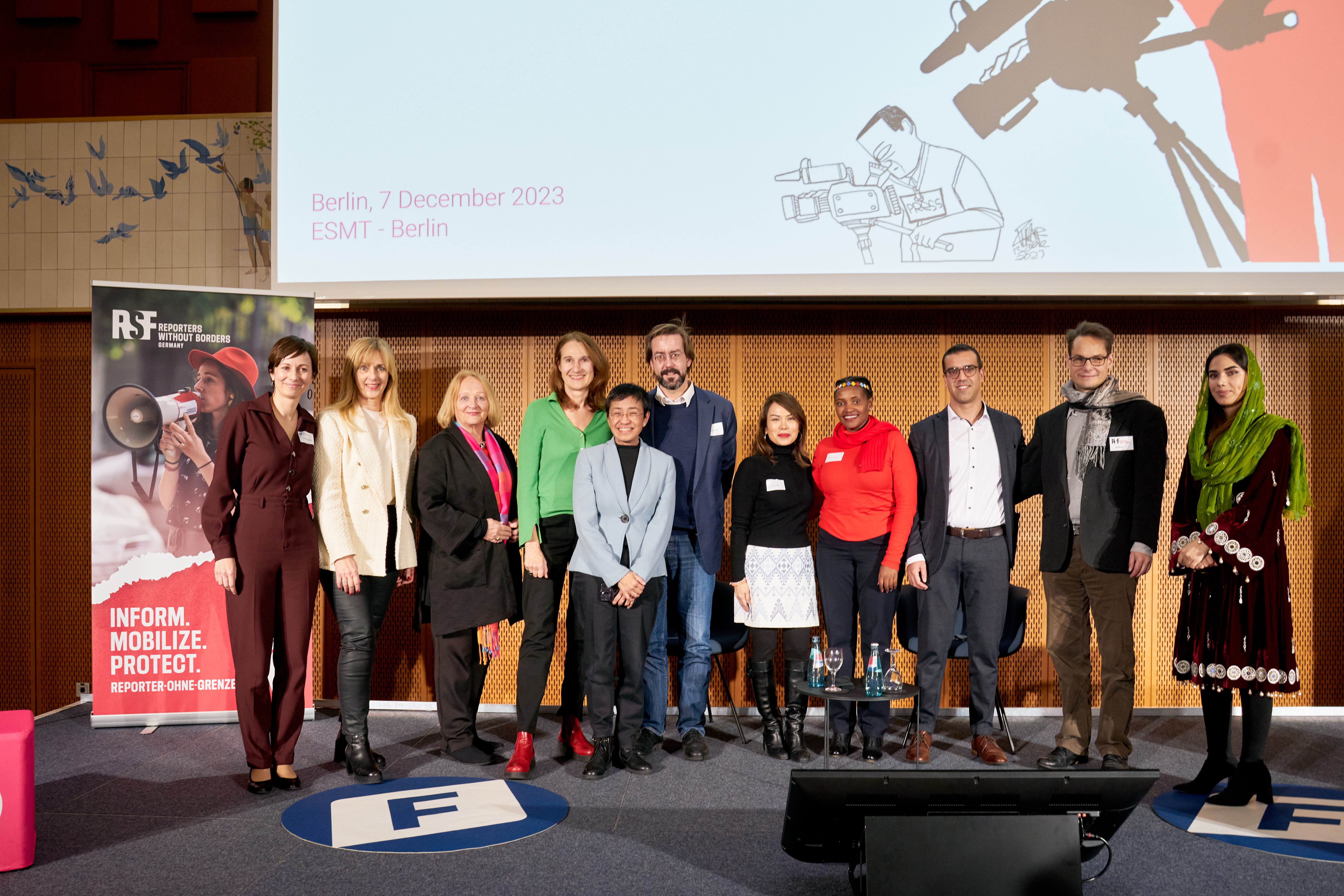
The Universal Declaration of Human Rights was adopted 75 years ago, and the UN Declaration on Human Rights Defenders is celebrating its 25th anniversary. To mark these two milestones, the Friedrich Naumann Foundation for Freedom (FNF) and Reporters Without Borders Germany (RSF) hosted a high-profile conference in Berlin on December 7. At the event called "Journalists Defending Human Rights", journalists from Mexico, Russia and Afghanistan reported on their own experience, and Philippine journalist and Nobel Peace Prize laureate Maria Ressa spoke about technology as a threat to democracy.
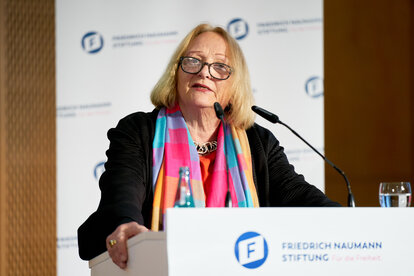
Sabine Leutheusser-Schnarrenberger, Deputy Chairwoman of the Friedrich Naumann Foundation for Freedom and former Federal Minister of Justice
© FrankNuernberger.deIn her welcoming remarks, Sabine Leutheusser-Schnarrenberger, Vice Chair of the FNF Board of Directors and former Federal Minister of Justice, outlined the enormous challenges journalists are confronted with today, from digital surveillance to virtual and very real violence. Christian Mihr, Executive Director of Reporters Without Borders Germany, called for concrete measures to better protect journalists, such as an export ban on spyware. Mary Lawlor, UN Special Rapporteur on the situation of human rights defenders, addressed the 25th anniversary of the UN Declaration on Human Rights Defenders in a video message. Lawlor emphasized the connection between a vibrant civil society and a free press. Where journalists are attacked, all human rights are under threat.
Those who expose crimes often become targets themselves
Those who uncover crimes, contradict official doctrine and denounce injustice often become targets themselves. Investigative journalist Sandra Romandía from Mexico writes about drug cartels and therefore needs around-the-clock personal security. The Afghan journalist and women's rights activist Wazmah Tokhi and the Russian media manager Ilya Krasilshchik live in exile in Germany; Tokhi escaped the Taliban in 2021, Krasilshchik was sentenced to eight years in prison by a Russian court in absentia. In addition to the situation for journalists in their home countries, the three panelists discussed how to obtain reliable information in repressive systems and a flood of disinformation, and what journalists under threat need from the international community. Their answer: solidarity, recognition and capacity building in countries where it is possible, or else visas, legal certainty and financial support for those forced into exile.
Installing malware on smartphones is a popular way to keep journalists under digital surveillance. Viktor Schlüter, Project Manager Digital Security Lab at RFS, explained how it can be detected using civil forensics. Ilze Brands Kehris, UN Assistant Secretary-General for Human Rights, also expressed her concern about spyware, online harassment, impunity and the deteriorating security situation for journalists worldwide, especially in areas of armed conflict. She appealed not to lose sight of the goals enunciated in the Universal Declaration of Human Rights.
Renate Schroeder, Director of the European Federation of Journalists, called for more solidarity with journalists who help the citizens of a country to exercise their right to information. Even in a relatively safe place like Europe, journalists suffer from a lack of public trust and uncertainty. Renata Alt, Member of the German Bundestag and Chair of the Committee on Human Rights and Humanitarian Aid, emphasized the important role of journalists in exposing human rights violations in autocratic systems. She reminded the EU of its special responsibility as a human rights champion.
Impunity for perpetrators exacerbates threats
Two central aspects were repeatedly mentioned by the speakers: First, impunity for perpetrators fuels threats and exacerbates risks for journalists and must be combated at all levels. Secondly, journalists play an indispensable role in safeguarding freedom of expression. Free, fact-based reporting is a public good that deserves to be valued by society.
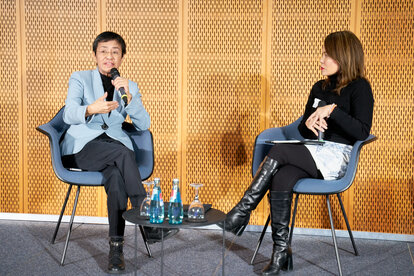
Journalist Ana P. Santos (right) having a conversation with Maria Ressa
© FrankNuernberger.deThe final part and highlight of the event was a discussion between freelance journalist Ana P. Santos and Maria Ressa, Nobel Peace Prize laureate and co-founder and CEO of the online news site Rappler in the Philippines, a partner organization of the FNF. During the six years of the Duterte government, Rappler was constantly in danger of closing down, and Ressa herself faced years in prison; two out of ten cases against her are still pending. For Ressa, the digital information ecosystem is a contributing factor to the rise of autocratic regimes – in her words, it is a "tech-enabled Armageddon".
2024 will be a fateful year for democracy
Instead of journalists, it’s algorithms and, increasingly, artificial intelligence that are now the gatekeepers determining which information reaches users. Instead of content or let alone a value system, the internet is about making money from harvested data. According to Ressa, lies are more profitable. They spread faster online than facts, as they stir up fear, anger and hatred. While only legislators have the power to hold Big Tech accountable, societies can and should now join forces to counteract the "pollution of the information flow" – for example through fact-checking campaigns, criminal charges for false claims and increased personal interaction outside the digital space.
Elections are due in many major countries in 2024. For Maria Ressa, nothing less than democracy is at stake.
Meike Wöhlert, Human Rights Officer at the Human Rights Hub, Geneva.
Here is where you find our publication Human Rights Defenders – Journalists
Picture gallery
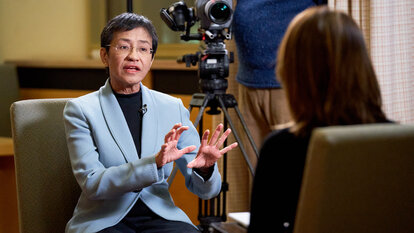
Maria Ressa
© FrankNuernberger.de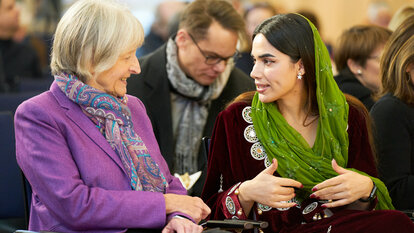
Anne Brasseur, Member of the Board of the Friedrich Naumann Foundation, in conversation with Wazhma Tokhi
© FrankNuernberger.de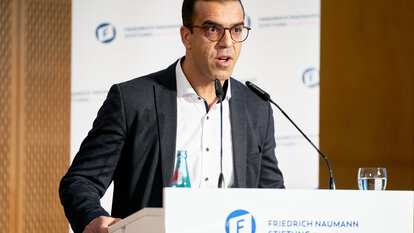
Dr. Salim Amin
© FrankNuernberger.de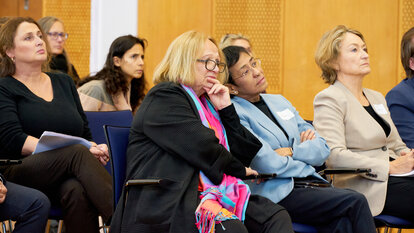
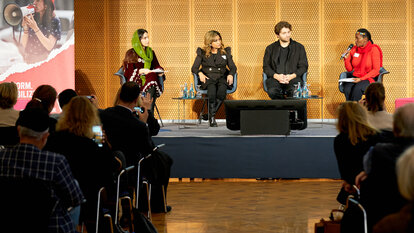
The Afghan publicist and women's rights activist Wazmah Tokhi, the investigative journalist Sandra Romandía from Mexico and the Russian media manager Ilya Krasilshchik.
© FrankNuernberger.de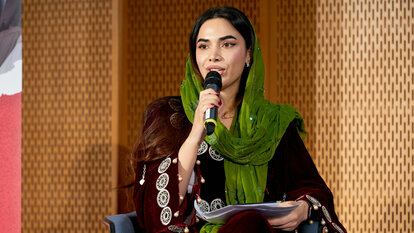
The Afghan publicist and women's rights activist Wazmah Tokhi
© FrankNuernberger.de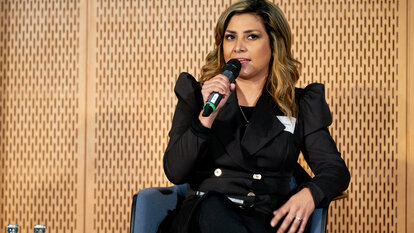
Investigative journalist Sandra Romandía from Mexico
© FrankNuernberger.de
The Russian media manager Ilya Krasilshchik
© FrankNuernberger.de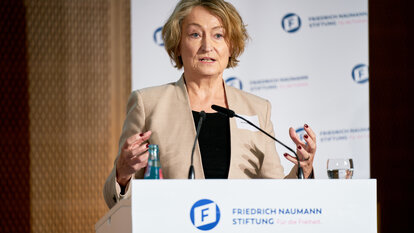
Ilze Brands Kehris, UN Deputy Secretary-General for Human Rights
© FrankNuernberger.de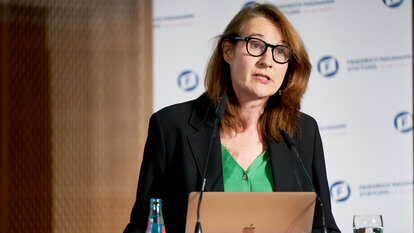
Renate Schroeder, Director of the European Federation of Journalists
© FrankNuernberger.de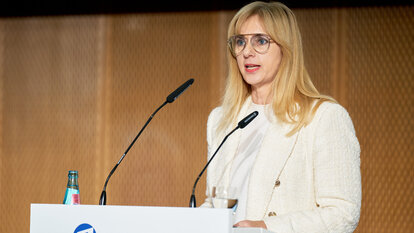
Renata Alt, Member of the German Bundestag and Chair of the Committee on Human Rights and Humanitarian Aid
© FrankNuernberger.de